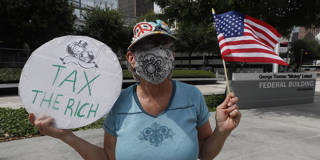The opening of the global economy over the past 30 years enriched multinational corporations, which have been able to shift profits to wherever the corporate tax rate is lowest. The G20 can take one step toward remedying that by accepting the proposed 15% minimum rate, but it should go much further.
PRINCETON – “The taxation system has tilted toward the rich, and away from the middle class, in the last ten years. It is dramatic, and I don’t think it’s appreciated. And I think it should be addressed.” So said the billionaire investor Warren Buffett 18 years ago. He illustrated his claim by surveying his office staff: although he was then the world’s second-richest person, he was paying a lower percentage of his income in taxes than his receptionist was.
Since then, economic inequality has only gotten worse, partly because of the rise of tech stocks that are immensely valuable but do not declare dividends. In 2020, six of the ten wealthiest Americans – Jeff Bezos, Mark Zuckerberg, Warren Buffett, Larry Page, Sergei Brin, and Elon Musk – were major shareholders of corporations that do not pay dividends. Together, they were worth $500 billion, or 0.5% of total US wealth.
Last month, a paper from the White House, co-authored by economists from the Council of Economic Advisers and the Office of Management and Budget, estimated that America’s 400 wealthiest families, all of whom had wealth exceeding $2 billion, paid federal income tax at an average rate of 8.2% if gains in unsold stock are counted as income. The average American taxpayer paid 13.3% of their income in federal tax.

PRINCETON – “The taxation system has tilted toward the rich, and away from the middle class, in the last ten years. It is dramatic, and I don’t think it’s appreciated. And I think it should be addressed.” So said the billionaire investor Warren Buffett 18 years ago. He illustrated his claim by surveying his office staff: although he was then the world’s second-richest person, he was paying a lower percentage of his income in taxes than his receptionist was.
Since then, economic inequality has only gotten worse, partly because of the rise of tech stocks that are immensely valuable but do not declare dividends. In 2020, six of the ten wealthiest Americans – Jeff Bezos, Mark Zuckerberg, Warren Buffett, Larry Page, Sergei Brin, and Elon Musk – were major shareholders of corporations that do not pay dividends. Together, they were worth $500 billion, or 0.5% of total US wealth.
Last month, a paper from the White House, co-authored by economists from the Council of Economic Advisers and the Office of Management and Budget, estimated that America’s 400 wealthiest families, all of whom had wealth exceeding $2 billion, paid federal income tax at an average rate of 8.2% if gains in unsold stock are counted as income. The average American taxpayer paid 13.3% of their income in federal tax.